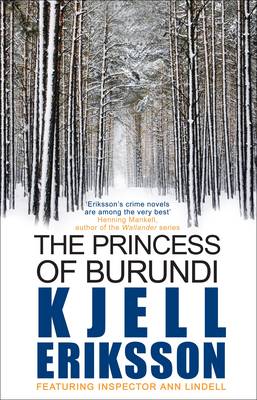
EURO CRIME
Reviews

Eriksson, Kjell - 'The Princess of Burundi' (translated by Ebba Segerberg)
Paperback: 350 pages (Oct. 2011) Publisher: Allison & Busby ISBN: 0749040092
A snowy December evening in Uppsala and a woman waits for her husband to come home. The meal is ready. Their son is back home. So why is her husband so late? She calls his brother, then his mother. Eventually she sits down with her son to eat the ruined meal and afterwards she continues to wait. Somewhere else in Uppsala, a man is sitting on a bus and staring at another passenger, a woman he attended school with all those years ago. She didn't give him the time of day back then, did she? She sickens him. He shouts at the foreigner sitting in front of him. People stare. He gets off the bus. Everyone sickens him. But now he knows what he has to do.
Then the body of a man is found on the outskirts of town next morning. The police team recognise him as John Johnsson, an ex-thief who in his own way was a good man. His killer has tortured and stabbed him to death. Who would want to do that to him? Someone will have to go and break the news to his wife and son.
The main plot and the focal point of the police investigation in Eriksson's THE PRINCESS OF BURUNDI revolves around who killed John Johnsson and why. The ex-small-time thief by the time of his death had become a collector of freshwater aquarium fish and everyone agrees that John Johnsson was a reformed character, unlike his brother Lennart.
The book also tracks the psychological disintegration of Vincent Hahn, an outsider who becomes lost in the world of his childhood victimisation as he targets his own potential victims. One of Eriksson's lead characters, Inspector Ann Lindell, appears even though she is on maternity leave. She gets drawn into the investigation and cannot resist some police work of her own, pushing her baby son's pram from interview to interview.
Eriksson does not choose his characters from Uppsala's affluent and comfortable. Instead they are usually those at the sharp end of societal stress. The welfare state wears thin, people and jobs are displaced, the police themselves struggle to solve and prevent crime before they burn out. At one point in THE PRINCESS OF BURUNDI there is a crime team meeting in which the police pause to discuss the new lawlessness and isolation in Swedish society. What causes it? What can they do about it? Henning Mankell, fellow Swede and leading crime writer, has said that he chose to write crime fiction (not least the famous "Wallander" series) because of its suitability as a vehicle for social comment. One can see that Kjell Eriksson shares Mankell's concern for getting to grips with the changes in Swedish society just as he shares a translator in Ebba Segerberg who has also translated several of Mankell's titles into English.
Eriksson's objectivity in his depiction of his characters, criminals, victims, and police alike, makes THE PRINCESS OF BURUNDI a deeply thoughtful piece of crime fiction. It's not a "wild ride" suspense thriller, there is no elaborately planned heist, blackmail or murder. Although it does have its moments. Frequently it is the very interactions of the characters themselves, whether trivial or meaningful, that form the triggers for events within the book. But this same objectivity and neutrality can result in a coolness of tone which may alienate some readers, particularly those who like to know a villain when they see one and like to be sure that the good are rewarded and the wrongdoers get what they deserve.
Just for once however, with the fiction of Kjell Eriksson, I would like to make what I consider to be a justified comparison with the crime fiction of Henning Mankell. And if you are a Henning Mankell fan looking to find another crime writer to read - then let me recommend Kjell Eriksson's THE PRINCESS OF BURUNDI as a good book and a good place to start.
Read another review of THE PRINCESS OF BURUNDI.
Lynn Harvey, England
December 2011
Details of the author's other books with links to reviews can be found on the Books page.
More European crime fiction reviews can be found on the Reviews page.